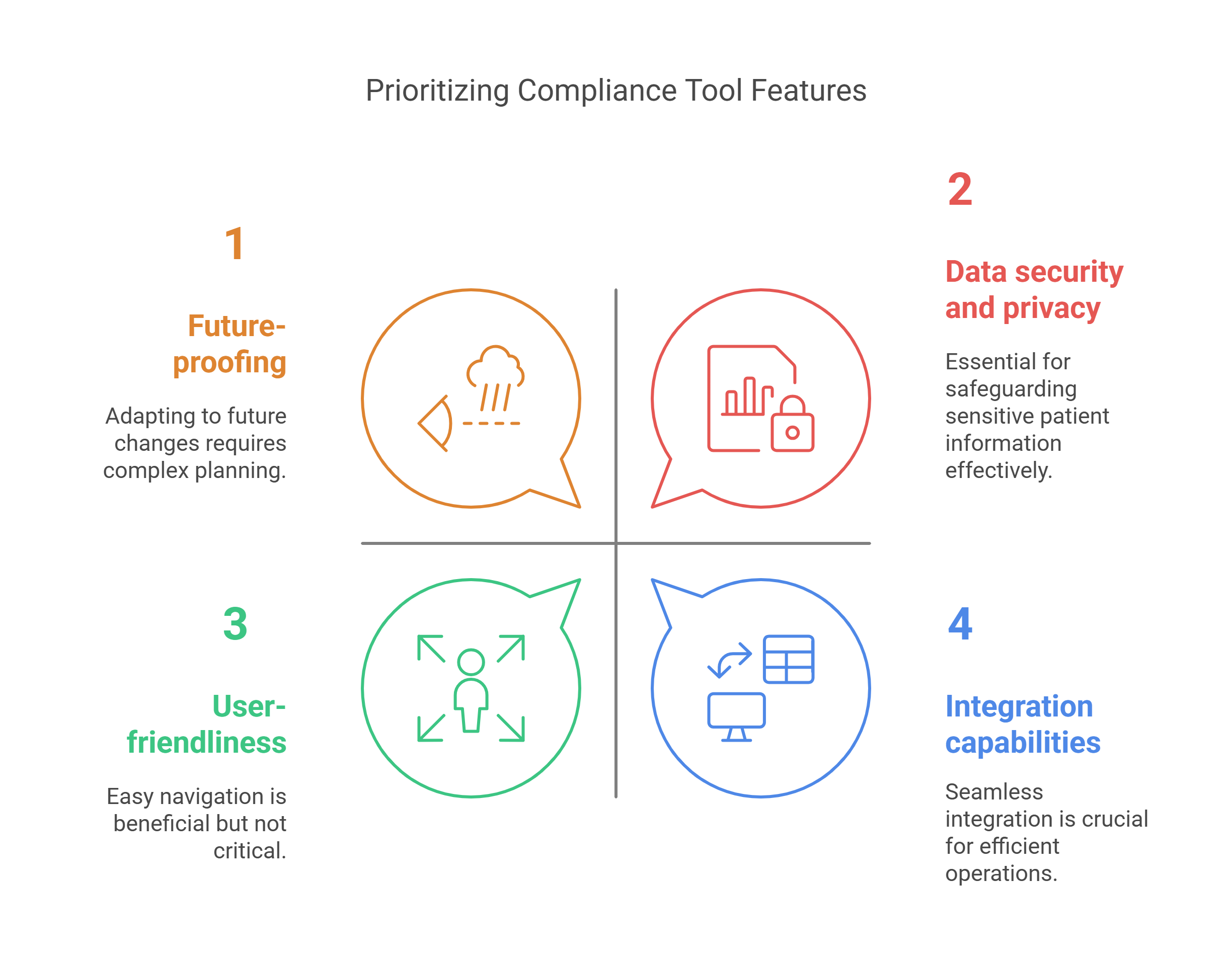As a dedicated healthcare professional, you're committed to providing the highest quality care to your elderly patients. But amidst the demanding nature of your role, it's easy to get overwhelmed by the complexities of aged care regulations.
What are Compliance Tools?
Compliance tools are digital solutions designed to simplify and streamline various aspects of aged care, making your life easier and your practice more efficient. They are like having a personal assistant who helps you stay organized, efficient, and compliant with regulations.
Key Benefits of Compliance Tools

- Risk Mitigation and Legal Compliance:
- Proactive Risk Management: Compliance tools empower you to proactively identify and address potential risks before they escalate into serious problems. By staying informed about the latest industry standards and regulations, you can implement preventative measures and minimize the likelihood of accidents or errors.
- Error Reduction and Accident Prevention: Automated systems, such as electronic health records and medication administration systems, reduce the risk of human error, such as medication mistakes or missed appointments. This not only safeguards your patients but also protects your facility from costly legal battles.
- Reputation Protection: Adhering to strict compliance standards is essential for maintaining a strong reputation and building trust with patients, families, and regulatory bodies. By demonstrating a commitment to quality and safety, you can avoid negative publicity and potential legal repercussions
-
- Enhanced Efficiency and Productivity:
- Streamlined workflows: Compliance tools automate repetitive tasks, such as scheduling, documentation, and reporting, freeing up valuable time to focus on patient care. For example, electronic health records (EHRs) eliminate the need for manual charting, reducing the time spent on administrative tasks. Additionally, automated medication administration systems can help prevent medication errors and ensure timely medication delivery.
- Centralized data access: With easy access to patient information and important documents, you can make informed decisions quickly and efficiently. Compliance tools provide a centralized repository for all patient data, making it easy to retrieve information when needed. This can be particularly helpful during emergencies or when coordinating care with other healthcare providers.
- Improved communication: Effective communication tools foster collaboration among staff members, ensuring smooth operations and timely information sharing. Compliance tools often include features like messaging systems, task management tools, and real-time alerts, which facilitate communication between staff members, patients, and families. This can help to improve coordination of care, reduce errors, and enhance patient satisfaction.
- Streamlined workflows: Compliance tools automate repetitive tasks, such as scheduling, documentation, and reporting, freeing up valuable time to focus on patient care. For example, electronic health records (EHRs) eliminate the need for manual charting, reducing the time spent on administrative tasks. Additionally, automated medication administration systems can help prevent medication errors and ensure timely medication delivery.
- Improved Patient Care and Outcomes:
- Personalized care plans: Compliance tools help you tailor care plans to meet the unique needs of each patient, promoting individualized care. By analyzing patient data and identifying specific needs, you can develop customized care plans that address their individual preferences, health conditions, and goals. This personalized approach can lead to improved patient satisfaction, better health outcomes, and a higher quality of life.
- Enhanced patient safety: By identifying and addressing potential risks, you can create a safer environment for your residents. Compliance tools can help you monitor patient conditions, track medication administration, and identify potential safety hazards. For example, real-time monitoring systems can alert staff to changes in a patient's vital signs, allowing for timely intervention and prevention of adverse events.
- Increased patient satisfaction: Efficient and organized care leads to happier and more satisfied patients and their families. By using compliance tools to streamline processes and improve communication, you can provide a more responsive and patient-centered experience. For example, electronic health records can facilitate timely access to patient information, allowing for better coordination of care and improved communication with patients and their families. Additionally, automated appointment reminders can help to reduce missed appointments and improve patient satisfaction.
- Personalized care plans: Compliance tools help you tailor care plans to meet the unique needs of each patient, promoting individualized care. By analyzing patient data and identifying specific needs, you can develop customized care plans that address their individual preferences, health conditions, and goals. This personalized approach can lead to improved patient satisfaction, better health outcomes, and a higher quality of life.
Choosing the Right Compliance Tool

When selecting a compliance tool, consider the following factors:
- Your facility's specific needs: Identify the areas where you need the most support, such as documentation, risk management, or staff scheduling.
- User-friendliness: The tool should be easy to navigate and use, even for staff who aren't tech-savvy.
- Scalability: As your facility grows, your compliance tool should be able to adapt to your changing needs.
- Cost-effectiveness: Consider the long-term benefits of investing in a quality compliance tool.
- Integration capabilities: The tool should seamlessly integrate with your existing systems, such as your EHR and financial software, to minimize disruptions and maximize efficiency.
- Data security and privacy: Ensure that the tool complies with relevant data protection regulations and provides robust security measures to safeguard sensitive patient information.
- Vendor reputation and support: Choose a reputable vendor with a proven track record and excellent customer support.
- Training and implementation support: Consider the level of training and support provided by the vendor to ensure a smooth implementation process.
- Future-proofing: Look for a tool that can adapt to future regulatory changes and technological advancements.
The Future of Compliance Tools in Aged Care
As technology continues to advance, we can expect to see even more innovative aged care compliance tools emerging in the aged care sector. These tools will further enhance efficiency, improve patient care, and reduce the administrative burden on healthcare professionals.
By embracing compliance tools, you can transform your aged care facility into a more efficient, safer, and patient-centered environment.
Don't let compliance be a burden. Empower yourself with the right tools to deliver exceptional care and peace of mind.


.png)
.png)



